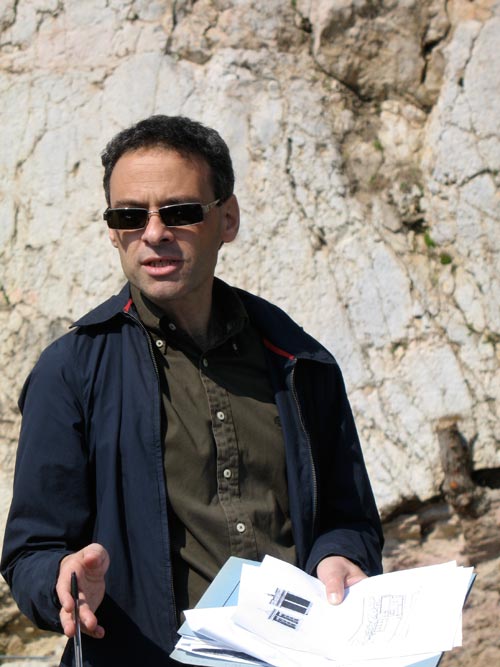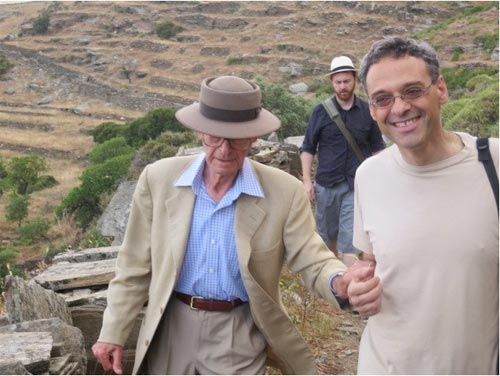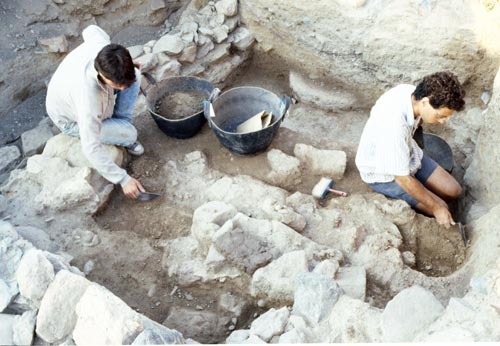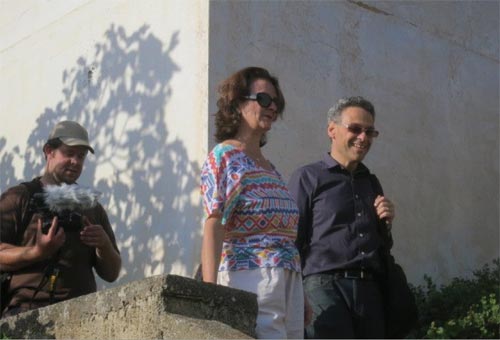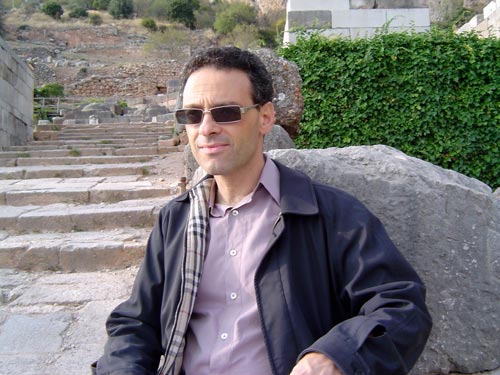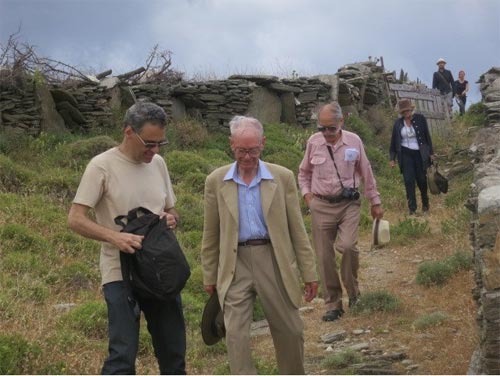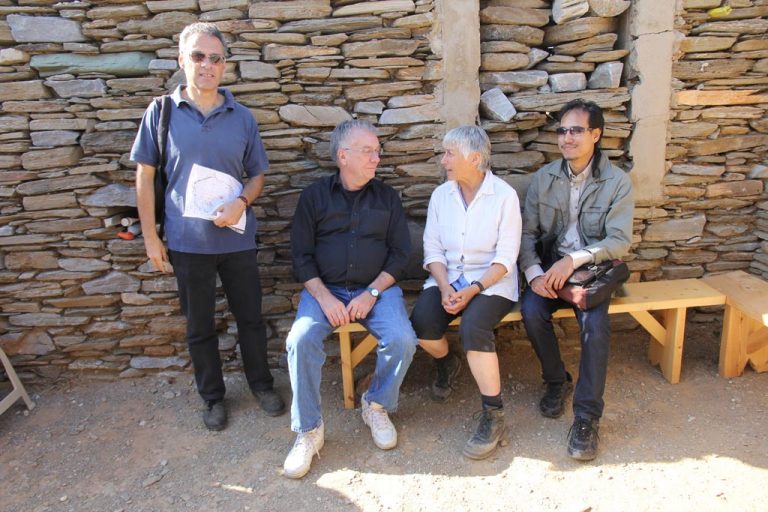Stavros Paspalas – Deputy Director, Australian Archaeological Institute at Athens
Why do you think archaeology is important?
Fundamentally, because it makes us think about our own lives and society. While we archaeologists deal, of course, with the past we can only interpret our finds through the refracting lenses of our own experiences. This means that as we learn about the past societies which are the focus of our attention we must continually take into account our own biases and how they may affect our interpretations. Consequently, these biases – what we take to be ‘givens’ – must always be scrutinised, with the result that our forays into the past are also forays into the present. This may not always be at the forefront of our minds, but it is always there (or, at least, should be).
When did you know you wanted to be an archaeologist, and what was it that made you want to be one?
I’m afraid I don’t remember how young I was when the idea entered by head, but it must have been at very early stage. I suppose it was only after I finished my Masters that I thought that I may actually have a realistic chance of being one, though.
What study did you do to become an archaeologist?
I did a B.A. (Hons.) and M.A. (Hons.) at the University of Sydney, which equipped me with a very sound basis, one which has held me in good stead over the years. In my B.A. other than Archaeology, I took Ancient and Mediaeval History courses, Classical and Modern Greek. I then went on and completed a doctorate. So, all in all it was about 10 or just over years of formal study.
How long have you been an archaeologist?
Well, I went on my first dig, in Bahrain, in 1982.
What are some of the key jobs you’ve had?
I have been fortunate enough to have spent all my professional life as an archaeologist. I had, of course, as a student a variety of jobs, but I can’t say they impacted in any great way on my development as an archaeologist.
What skills or capabilities do you think are important to being a good archaeologist?
As there are so many different sorts of ‘archaeologists’ there is no one set of skills. Definitely, a clear eye for details and pattern recognition are important, though one should never lose sight of the bigger picture. If one aims to enter academia then it is very important to develop effective speaking and writing skills. Imagination is, of course, important – just as important as in every other field of human endeavour. Paradoxically, one should always be open to everything that is new, both new material and new ways of approaching it. Good people skills are also a prerequisite, especially if you hope to undertake a lot of fieldwork given that you will be living for considerable periods of time in close confinement with others.
What advice would you give to someone interested in this career?
Be prepared to put in many, many hours of work, and dispel any inklings of the thought that an archaeologist’s job falls into the 9 to 5 category. Here I must add, that prospective archaeologists of the Mediterranean area and its hinterlands, or those – at least – that wish to make an academic career in the field, must gain at least a reading knowledge of a range of foreign languages. Unlike what I believe to be the situation in some other fields, Mediterranean/Classical/Near Eastern archaeology is not a monolingual exercise.
One should also keep in mind the point I made earlier: there are many different sorts of archaeologists; there are some who specialise as excavators, and then there are those who take on one of a vast range of fields to study, e.g. ceramic, architecture, glass, metals, faunal remains, floral remains, physical anthropology, etc. Then there are others who have focussed on archaeology and various computer applications, or on more art historical aspects of the field, etc. So follow your own interests and inclinations and see how they can be applied to the study of the past.
How do archaeologists spend their time?
Well, at least in my experience, something like 10 to 15% of one’s time is in the field, and the remainder is divided between administration (far more than most people think) and research. The latter includes writing. Those who are employed in universities spend a great deal of time teaching, marking and advising. One should also make time to convey recent (and sometimes not-so-recent) findings to the interested public.
What’s it like living in the ‘dig house’ during a dig?
Every dig house is different. Sometimes there is a designated cook, other times the general team members are rostered. I know of expeditions (not many) which actually provide an allowance for their members so that they can eat at local restaurants/taverns. Especially during field seasons (and even in study seasons) early morning rises are a must. Sometimes the dig house is close to the site, so travel time is minimal; at other times one may need to travel by car and/or walk for an hour or so. There are no set rules.
Archaeologists must be adaptable, if nothing else. It is a given that after a tiring day in the field a few hours each afternoon must be dedicated to writing up notebooks, reports, etc. The higher one ascends in a team the greater amount of such work he/she will have to undertake. Truth be told, dinner is very often the main recreation time, though one day every week should be off, and very often digs allow for a two-day weekend mid-season. Not the most comfortable of circumstances, but we do archaeology because we are driven.
Which parts of your job do you love, like, not so much….?
I’m not so enamoured of the administration, but I love the thrill of encountering new things and the hunt that is involved in the research that leads to their elucidation and the context in which they were made, used and deposited/discarded – our understanding of past people and times.
How do you and your family cope with separation during archaeological digs?
Well, as I am single I don’t have to face that issue.
What’s been your worst experience in archaeology?
Other than the excessive heat at times, my worst experience has been cleaning a rat-infested storeroom. Not fun.
What’s been your best experience in archaeology?
I suppose the excavation of my first complete skeleton remains my most memorable experience, so that may rate as my “best experience.” However, meeting and forming friendships with a number of very memorable individuals must be the greatest plus, even if it doesn’t necessarily fall into the usual “best experience” category.
What’s your realistic and/or dream hope of archaeological achievement?
I’d rather focus on my “unrealistic” hope: finding Alexander the Great’s tomb.
What are some words you would use to describe your experiences as an archaeologist?
Exciting, tiring, rewarding, enlightening, frustrating.
Is there anything else you would like to share with our readers?
Archaeology, both in the field and in the arm-chair, always offers its exponents ever-widening horizons – surely its greatest boon.
